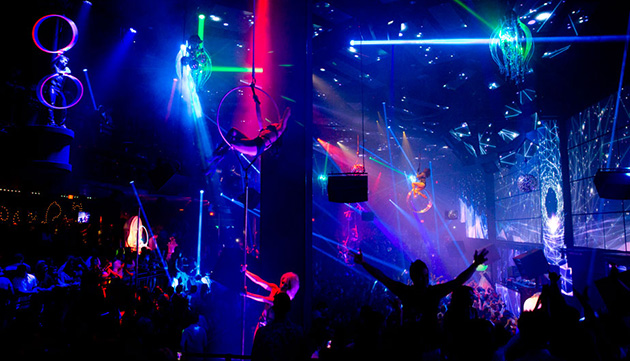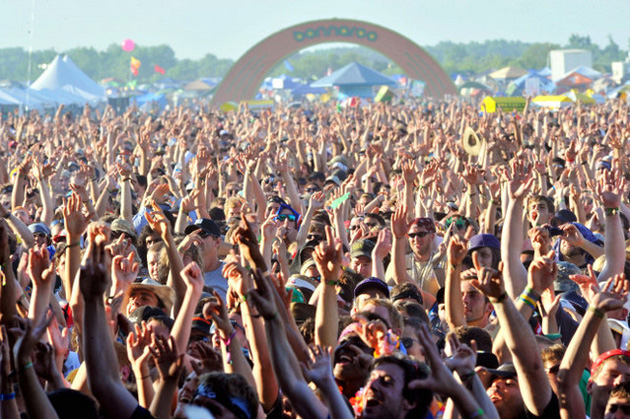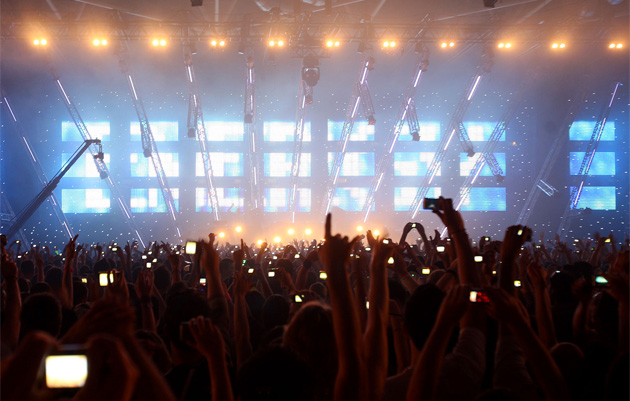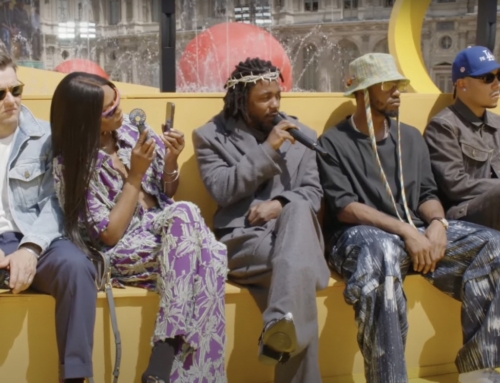By this point, you’ve likely heard about the three electronic music festivals coming to Detroit in mid 2014. Movement – the successor in name to the Detroit Electronic Music Festival, or simply DEMF – returns from May 24 to 26, while DEMF has been resurrected as a free event. A third event, the Federation of Electronic Music Technology (FEMT), will go on the same time at DEMF, albeit with a cost and in another part of town.
Promotion for the new DEMF just started. What’s noteworthy is, Carol Marvin, one of DEMF’s original promoters who departed in 2002, has been doing the legwork to revive this electronic music institution. However, in the press event announcing the new DEMF, she claimed, “We’ll never use the term ‘EDM.'”
There’s a couple of ways to look at this statement. One, EDM no longer fully stands for “electronic dance music”; rather, it’s this weird umbrella-but-not-really term that covers progressive house, brostep, and anything that tops the charts in North America. Two, it’s turned into a marketing buzzword that’s interchangeable with the whole spectacle over substance approach that pervades almost every festival from Electric Daisy to Electric Zoo. Three, the underground and instrumental sides of electronic music have distanced themselves from this acronym, which now embodies everything commercial about dance and synthesizers.
But, on the flipside of this, Marvin’s tone verges on holier-than-thou, as if to say, “We’re the real electronic music, and the rest of you are a bunch of commercial cheese.” We’ve touched on why EDM is and isn’t the best term for describing all of electronic music, but Marvin’s assertion either represents a pushback or full-on hypocrisy.

DEMF’s Full of It
If you take a jaunt over to the DEMF website, you’ll find the event has five stages for roughly 100 performers, including those from overseas. While there’s predictably a Detroit techno stage, International and Main stages apparently feature the top DJs from more than 20 countries. The DEMF World Club and DJ Ambassador Program featured looks to be a “veritable Olympics of electronic music, a United Nations of Techno.”
As has been the case with Movement, Detroit techno veteran Juan Atkins curates the lineup.
Most of this wouldn’t seem significant, except Billboard shed light on the process behind the 2012 Movement lineup – a time when David Guetta asked if he could be included and was rejected.
“We feel a responsibility to utilize this festival as a chance to maintain a sense of history and heritage about the music itself,” said James Canning, media director for Movement promoters Paxahau, in a statement at the time. “We think
Again, keeping it local and underground might seem like a good thing, until you realize Movement’s past lineups often include performers not from the area who’ve gained a modicum of success. Most notably, Skrillex played there in 2011, and Deadmau5 is said to have performed on a card table there in 2008. 2012 attracted Major Lazer, Araabmuzik, SBTRKT, Adventure Club, and Cassy – all prominent club, if not festival, performers. 2013, similarly, included Art Department, Moby, John Digweed, Nicole Moudaber, and Squarepusher on the bill.
So, the question then becomes, where do Movement’s promoters draw the line between “electronic music” and “EDM”? Are Digweed and Moby safe names because of history (more than likely), even though they’re likely to appear on a headlining or second-tier stage at other U.S. electronic dance music festivals? Does having an album on the Billboard 200 suddenly exclude a DJ from the lineup, even though he played there years ago, like Deadmau5?

So Just Say “Commercialism”
Any underground trend that breaks into the mainstream experiences some degree of backlash, and maybe Marvin’s statement is one extremely small component of that. Back in 2012, DiscoDemons.net pointed out that EDM has been used as a catch-all word for electronic music, including in pre-commercialization times. Now, the term represents a fan that doesn’t know electro from techno, deep house from dubstep, and just goes to the major festivals to hear some big beats and simple synth melodies and to sing along with the words.
The opposite appears to be Europe’s electronic dance music scene, where subgenres still remain clearly defined and club culture has greater roots, in spite of American origins.
Intertwining with this is the marketing aspect. While more and more marketers are looking at EDM culture because of the millennium edge (as opposed to thinking all between the ages of 15 and 30 are enamored with the hipster aesthetic), promoter Kathryn Frazier described the term as a pitching buzzword — a term that, for better or worse, got artists like Skrillex in the pages of mainstream music magazines and brought a handful of electronic subgenres to light in North America. “I don’t recall hearing EDM a whole lot,” she told Resident Advisor. “But media like to have something to wrap things up with, and EDM is a very convenient tool for them to wrap up a very large world.”
“Commercialization,” however, isn’t all about marketing and once-underground artists reaching the mainstream. Instead, as Mixmag pointed out in a series of pieces over the past year, “EDM” signifies a lower quality of performance – producers-turned-DJs who don’t really DJ, bright lights that overshadow the music, and a craft that’s gradually being lost in the face of dollar signs.
Writer Tim Sheridan encapsulated this sentiment in a single statement, even though his September 2013 editorial was all over the place with its purple, bloated prose: “The spectacle, money and the showbiz have overtaken all – even notions of honesty.”
Markus Schulz similarly told Mixmag in 2012 that fame and status as a globally-known DJ isn’t going to those with experience. Rather, all it takes is a hit single. “And you know, there really is a true art form to DJing, and simply rolling out with a one-hour set of the Beatport top ten is not it,” he told the magazine at the time. “Some ‘DJs’ tour the world with a hour and a half pre-recorded set because they’ve had a hit and have been ‘forced’ to learn to DJ. It’s vital that people like me, and you guys at Mixmag, don’t let the art-form be forgotten.”
So, perhaps, then, Schulz’s statement, coupled with the commercial implications, are why the new DEMF has eschewed EDM, but we’ll have to wait and see if the lineup truly promotes the authentic art form, or if it’s just a bunch of lesser-known producers that may one day hit it big pressing play.




